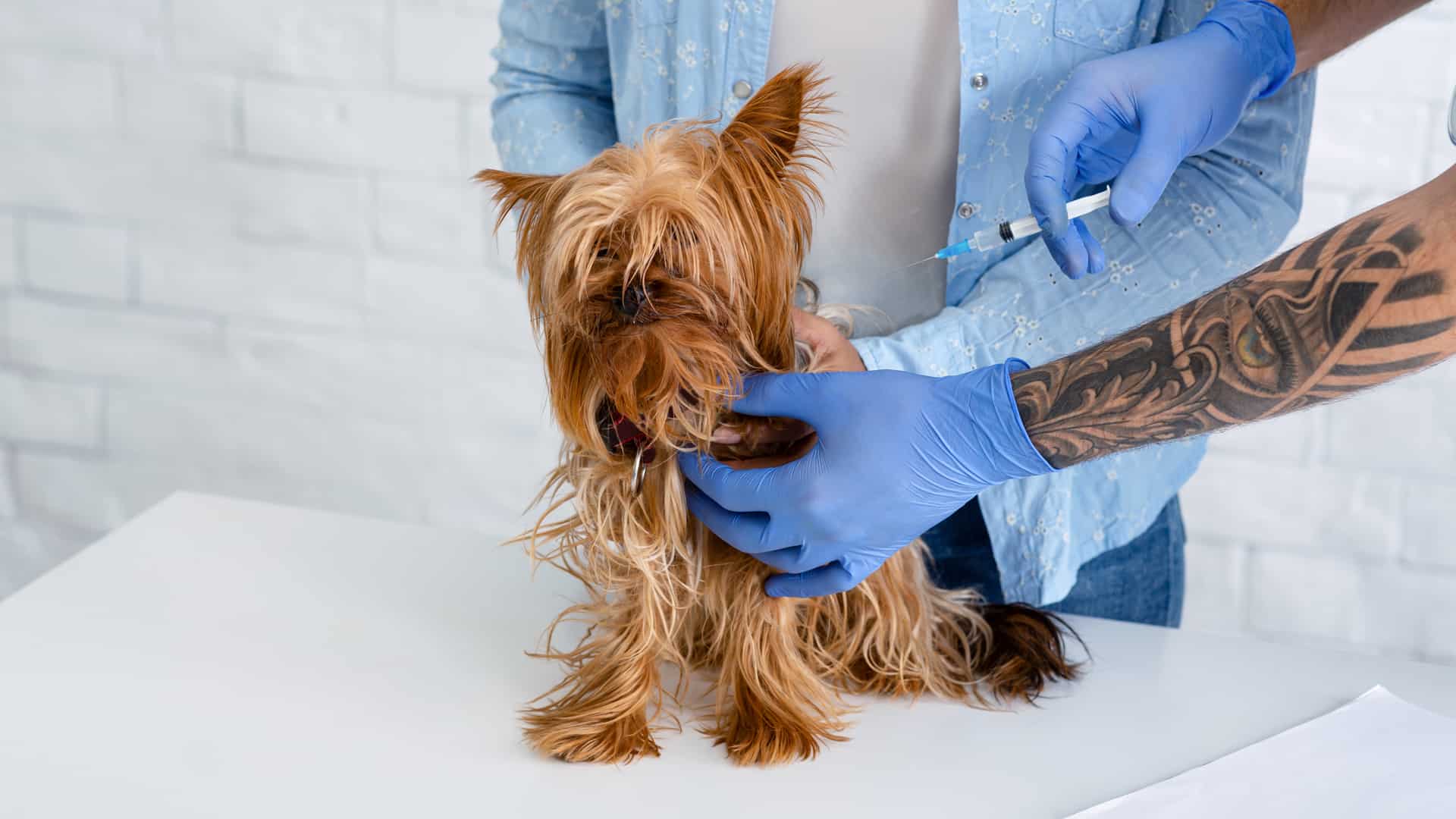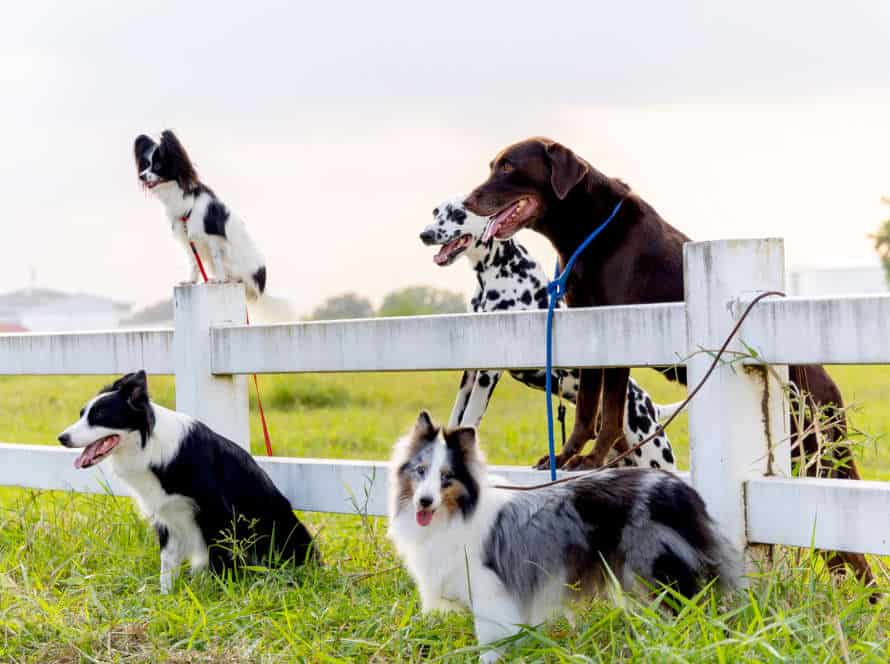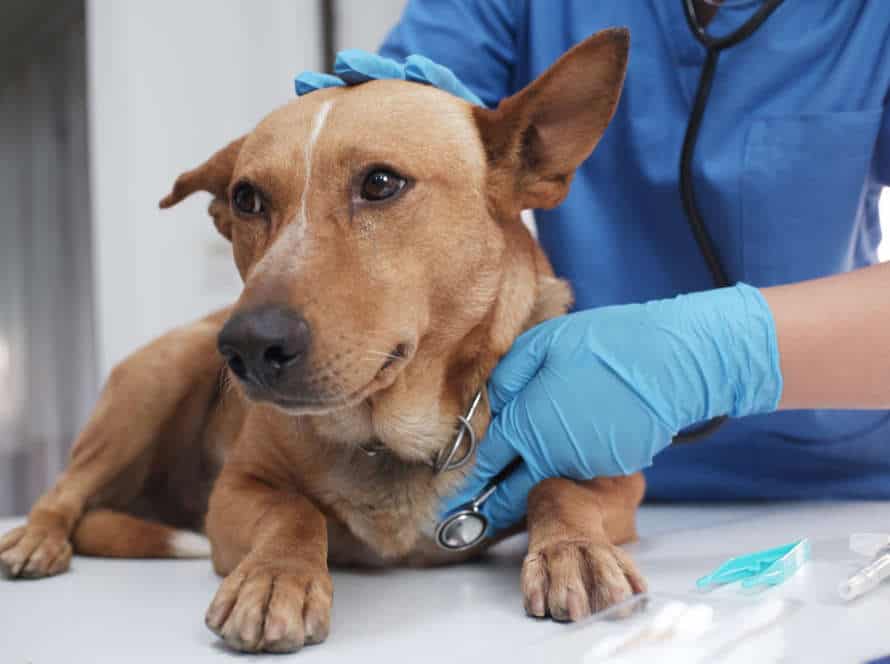Puppy Vaccination Schedule: What You Need to Know
The puppy vaccination schedule is important for protecting your pup’s health. Here’s what you need to know:
- 6-8 Weeks: They get their first round of DHLPP and Bordetella vaccines. DHLPP protects against Distemper, Hepatitis, Leptospirosis, Parainfluenza and Parvovirus. Bordetella is also known as kennel cough.
- 10-12 Weeks: Second shot of DHLPP and Bordetella and the first dose of rabies vaccine.
- 14-16 Weeks: Third round of DHLPP and Bordetella, and the second dose of rabies vaccine.
For long-term protection, annual boosters are recommended. Vaccination is vital for a happy life.
Types of Vaccines for Puppies
Vaccines for puppies – essential! They guard against serious ailments. Let’s see which ones are necessary and why.
Puppy vaccines are a must – they keep your pup safe and sound. They protect from diseases and illnesses. So, what type of vaccines are suggested for puppies? Let’s find out and understand why they’re important.
Core Vaccines
Core vaccines are essential for all puppies and dogs, no matter their age, lifestyle, or environment. These vaccines protect against dangerous diseases.
Puppy core vaccines include:
- Distemper – a virus that damages organs, can cause severe illness or death.
- Parvovirus – a highly contagious virus, causes vomiting, diarrhea, and dehydration, deadly for puppies.
- Hepatitis – a viral disease that impacts the liver, can cause severe illness or death.
- Rabies – a virus transmitted through saliva, can be deadly for both humans and animals. Many states legally require Rabies vaccination.
Your puppy’s vaccine schedule is based on age and health status. Ask your vet for a personalized schedule. Plus, regular booster shots throughout your dog’s life are key for ongoing protection against infectious diseases.
Non-core Vaccines
When it comes to vaccinating your pup, there are two types. Core vaccines are essential. Non-core vaccines are optional. They depend on lifestyle and environment.
Non-core examples are kennel cough and Lyme disease. If pup goes to dog parks, daycare, or boarding – kennel cough is a good choice. For high Lyme disease areas or camping – Lyme vaccine is recommended.
Talk to your vet about which non-core vaccines are best. By following core and non-core vaccines, you can keep pup happy and healthy for years.
Required Vaccinations for Puppies
Puppies must be vaccinated for their well-being. It’s key to protect them from diseases that might be deadly.
Core Vaccines are needed for all puppies. These will guard against parvo, distemper, and rabies.
Non-core Vaccines are optional. These may help depending on the puppy’s lifestyle and risk of exposure. Examples include bordetella, Leptospirosis, Lyme, and canine influenza.
It’s important to give puppies their vaccinations. This builds immunity to common and dangerous illnesses. Vaccinations usually start at 6 weeks old. After this, boosters shots occur every few weeks until 16 weeks old. Check with your vet to make sure your pup gets the right shots at the right time.
When to Vaccinate Your Puppy
Vaccinating your puppy is essential for their health. It’s a tough call to know when and what vaccines to give. Here’s the scoop. This article will provide all the info you need about puppy vaccinations.
Initial Vaccination
Vaccinating your puppy is essential for their health!
Remember these tips:
- Puppy vaccinations should start between 6-8 weeks.
- This provides protection from diseases like parvovirus and distemper.
- A second round of vaccines should happen at 10-12 weeks, and again at 14-16 weeks.
- The first year is especially important for full vaccination.
- After the initial series, booster shots should be given annually or every three years, depending on the vaccine and the vet’s advice.
Booster Shots
Booster shots are a must for puppy health and protection. They are an extra dose of vaccinations to keep immunity levels up, preventing severe infections that can be fatal.
The first round of vaccinations should take place between 6-8 weeks, then regular boosters every 2-4 weeks until 16 weeks. It’s not a one-time deal – boosters need to continue throughout a puppy’s life. Missing one means the pet can be vulnerable to serious illness.
Talk to your vet about the list of essential booster shots needed, and when they should be given. Staying on top of vaccinations is key to good health for your pup!
Vaccination Schedule for Puppies
Vaccines are key for your puppy’s health. You must understand the proper vaccination schedule for puppies, and the risks of not vaccinating. This article looks at what you need to know. It covers creating a puppy vaccination schedule and the risks of not vaccinating your pup.
6 to 8 Weeks Old
Puppies need special care when it comes to vaccinations. At 6-8 weeks old, get your pup their first round of shots. These include:
- DHPP: Distemper, hepatitis, parvovirus, and parainfluenza.
- Bordetella: Prevents kennel cough.
Make sure to visit your vet at 6-8 weeks old. Discuss future vaccines and booster shots with them.
Tip: Keep a record of your pup’s vaccine schedule. Most boarding facilities and dog parks require proof.
10 to 12 Weeks Old
Puppies need their 2nd round of vaccinations at 10-12 weeks old. This is why:
At 6-8 weeks old, they get 1st round shots – distemper, hepatitis, parainfluenza and parvovirus.
At 10-12 weeks, they have their 2nd round of the same shots.
At 12-16 weeks, they have 3rd round which includes rabies too.
It’s essential to keep up the vaccination schedule for protection against illnesses and diseases. Ask the vet for advice.
Pro Tip: Vaccinate them before taking them out or meeting other dogs.
14 to 16 Weeks Old
At 14-16 weeks old, pups need their third round of vaccinations to protect them against deadly diseases. Here’s what they need:
- Rabies. This is a must-have. It’s required by law and keeps everyone safe.
- DHPP. This protects against four viruses, which can be severe for pups.
- Bordetella. This guards against kennel cough. It’s contagious, so be wary in places with other dogs.
Note: Vaccination plans differ based on location, breed, and vet advice. Ask your vet for the best plan for your pup.
12 to 16 Months Old
It’s the time for your pup to get their last round of shots. This is part of the puppy vaccination routine.
The shots include:
- Rabies: Most states make rabies vaccination mandatory. It is given to pups around 16 weeks old. A booster is needed 12-16 months later and then every 1-3 years per local rules.
- DHPP: The DHPP shot protects against distemper, hepatitis, parvovirus and parainfluenza. It is given in three shots, starting 6-8 weeks old. Boosters every 3-4 weeks until 16-20 weeks old. Afterwards, it’s a yearly or triennial booster per local regulations.
- Bordetella: This defends against kennel cough. Initial vaccination 8-16 weeks old. An annual booster afterwards.
Pro Tip: Keep track of the puppy’s shots and booster schedules. Check with the vet for the best routine.
Risks Associated with Vaccination
Puppy vaccinations are key for your pet’s health, however, there are risks. Possible side effects and other drugs interacting with the vaccine could occur. Therefore, it is essential to be aware of the hazards of vaccinating puppies. In this article we will cover the potential risks involved in puppy vaccinations so you can make an educated judgement about your pup’s health.
Mild reactions
Puppy vaccinations have mild reactions as the most common risk. These include soreness, swelling, redness at the spot of the injection, decreased appetite, sleepiness and fever. Here are ways to manage these reactions:
- Apply a cold compress or ice pack to the injection spot.
- Get your pup to drink water to stay hydrated and reduce tiredness.
- Limit their physical activity for 1-2 days after vaccination to let their body rest and recover.
- Contact your vet if the symptoms keep going or worsen, or if you see any severe reactions e.g. vomiting, diarrhea or breathing issues.
Remember, vaccinations protect against deadly diseases. The benefits are greater than the risks, even if mild reactions occur.
Allergic Reactions
Allergic reactions from dog vaccinations are rare. But, the benefits of vaccination are greater than the risks. It’s important to know the risks before deciding your puppy’s vaccination schedule.
Signs of an allergic reaction in dogs include trouble breathing, swelling, hives, vomiting, and diarrhea. If you see any of these shortly after your pup’s vaccination, call your vet right away.
Your vet can help you decide the best vaccination schedule for your puppy. This depends on where you live, their age, and breed.
Other Risks
Vaccinating your puppy is important for their health, but it’s also important to understand the risks. These include:
- Mild reactions – Such as soreness, swelling, redness at the site of the injection, or a low fever. These should go away in 1-2 days.
- Allergic reaction – Rare, but severe symptoms such as anaphylaxis, or loss of consciousness can occur. Monitor your puppy closely after vaccination.
- Vaccine failure – An extremely rare risk, where the vaccine doesn’t provide immunity.
- Disease transmission – Although precautions are taken at vet clinics, some puppies may still get an infection from other patients.
Discuss any questions or worries with your vet before vaccinating.
Pro Tip: Keep records of your pup’s vaccinations, including type of vaccine, date given, and any reactions.
Precautions to Take After Vaccination
Once your pup is vaccinated, take precautions to make sure the vaccine is effective. Watch out for any side-effects. Check activity levels. And give plenty of rest. Here, we delve into these tips. So, you can ensure your pup’s health.
Keep Your Puppy Comfortable
Vaccination is done? Now take extra care of your pup! Here’s how:
- Keep them hydrated. Have clean water available for them to drink often.
- Watch their appetite. If they don’t have much of an appetite, give them small meals at a time.
- Monitor their energy. Puppies may be tired or lethargic after vaccination – give them lots of rest.
- Avoid potential hazards. Keep them away from other pups, risky areas, and bad weather.
- Schedule check-ups. Set up a post-vaccine appointment with the vet to make sure they are healthy.
Extra: Keep the vet’s number handy in case of any emergencies.
Monitor Your Puppy’s Condition
It’s key to check your pup’s condition after their vaccination. Look out for any signs of problems, such as vomiting, diarrhea, laziness, or not eating. Give them lots of rest and quiet after the jab. Don’t wash them or take them for a walk for a day or two. Keep them away from animals that are not vaccinated until their full course of shots are done. If you see anything strange, check with your vet straight away. Taking these precautions will make sure your puppy gets better and prevents them getting any infections.
Follow-Up Appointments
After vaccinating your puppy, follow-up appointments are important. Here’s what to remember and what to do:
- Keep track of your puppy’s vaccine shots. Some need boosters at certain times.
- Protect your pup from sick pets and public places until the full vaccination schedule is complete.
- Watch for symptoms like vomiting, diarrhea, or lethargy after the vaccination. Contact your vet if you observe any.
- Schedule regular vet check-ups once vaccinations are done. This ensures continued health and well-being.
The Importance of Puppy Vaccinations
Vaccinating your pup is a key part of their wellness. Vaccines stop pups from getting avoidable sicknesses and should be done according to the suggested plan. Knowing the various types of vaccines available and when to give them is significant for looking after your pup.
In this article, we’ll chat about the significance of vaccinations for puppies and the suggested plan.
Protecting Your Puppy
Protecting your pup is essential! To keep them healthy, proper vaccination is a must. These shots can shield your puppy from various illnesses and infections – some of which can be deadly.
Here’s what you should know about puppy vaccination schedule:
- 6-8 weeks old: Initial round of vaccinations – distemper, adenovirus, parvovirus, and parainfluenza.
- 10-12 weeks old: Second round of the same vaccines.
- 14-16 weeks old: Third round of the same vaccines.
- After 1 year: Booster shot for immunity.
The vaccination schedule may vary depending on the breed, health, etc. So, talk to your vet to get the best plan for your pup. Always remember, prevention is key – don’t miss any recommended vaccinations.
Protecting Others
Vaccinating your pup is vital – not only for their wellbeing, but also to shield other canines and animals they come into contact with. Here’s the 411 on puppy vaccinations and their timetable:
- Puppies should get their first shots at 6-8 weeks old.
- Booster shots should take place every 3-4 weeks until pup is 16 weeks old.
- Vaccines should protect against distemper, hepatitis, parainfluenza and parvovirus.
- Depending on age, health and lifestyle, vets may suggest other vaccines.
Vaccinating your puppy helps protect not only them, but also any other dogs they meet at parks or on walks. Remember to follow the vaccination schedule and keep records up-to-date.
Legal Requirements for Puppy Vaccinations.
Puppy vaccinations are essential for keeping your pup safe from diseases that could be fatal. But there are also laws you must follow for vaccinating your pup.
Depending on where you live and the age of your puppy, certain vaccinations may be required for licensing and going to public places. Examples include rabies, distemper, and parvovirus.
Consult your vet for a puppy vaccination schedule. This usually includes shots in the first few months and regular booster shots.
Even if there are no legal requirements in your area, vaccinating your puppy is a must. Rabies and parvovirus can be deadly. Vaccinating your pup is an easy and affordable way to protect them.
Frequently Asked Questions
1. What is a puppy vaccination schedule?
A puppy vaccination schedule is a series of shots administered to puppies starting from the age of six weeks to make sure they are protected from infectious diseases.
2. Why is it important to follow a puppy vaccination schedule?
It is important to follow a puppy vaccination schedule to ensure that your puppy is protected from infectious diseases such as parvovirus, distemper, and rabies. Vaccines are also necessary to protect other pets and people that your puppy may come in contact with.
3. What vaccines are required for a puppy?
The vaccines required for puppies include the DHPP (distemper, hepatitis, parvovirus, and parainfluenza), rabies, and can be followed by other vaccinations depending on your veterinarian’s recommendation.
4. When should a puppy first start its vaccination schedule?
A puppy should first start its vaccination schedule at 6-8 weeks for the initial vaccine, and then follow-up shots every 3-4 weeks until it is 16-20 weeks of age.
5. What happens if a puppy misses a scheduled vaccine?
If a puppy animal misses a scheduled vaccine and the time elapsed is too long, the puppy may need to restart the vaccine series. Check with your vet to see what the recommendation is based on your pet’sstatus..
6. Are there any potential side effects of puppy vaccines?
Puppy vaccines can have minor side effects such as soreness at the injection site, a mild fever, and loss of appetite. Serious side effects are rare, but severe reactions can include vomiting, diarrhea, or difficulty breathing. If you notice any of these symptoms, call your veterinarian immediately.







